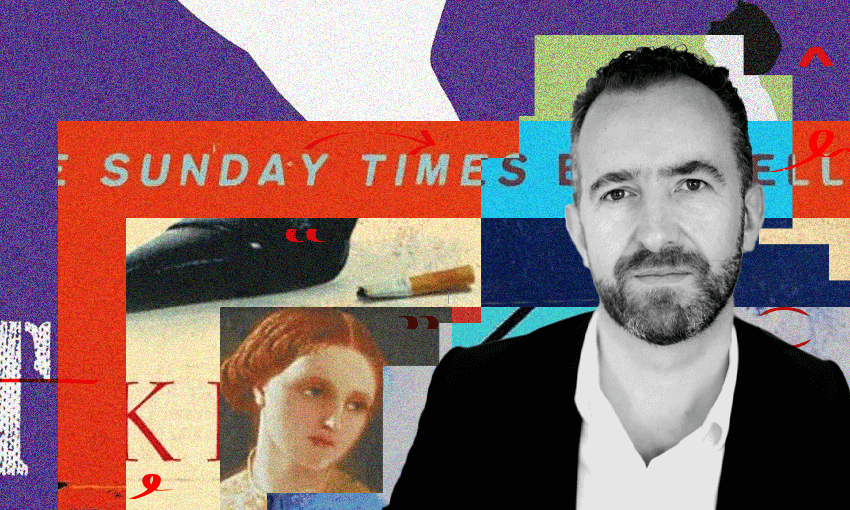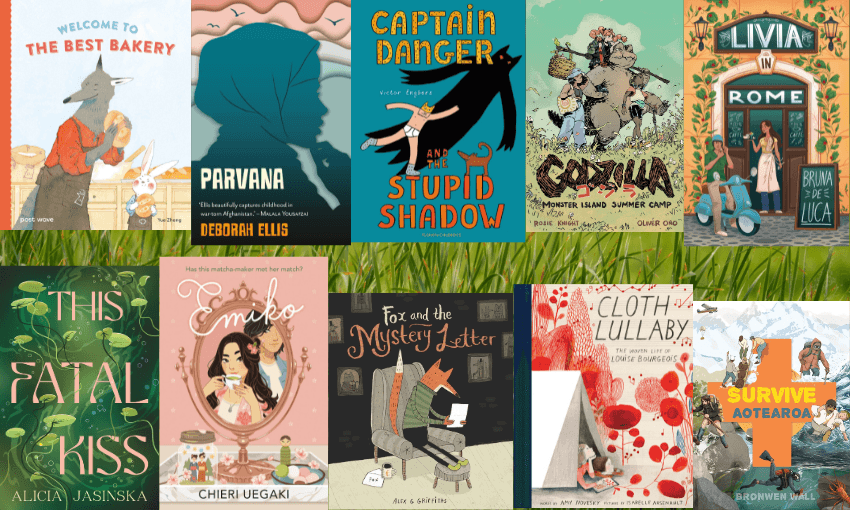Welcome to The Spinoff Books Confessional, in which we get to know the reading habits of Aotearoa writers, and guests. This week: Carl Shuker, author of new novel The Royal Free.
The book I wish I’d written
I wish I’d written Philip Hensher’s Kitchen Venom. No one talks about it any more after its big splash in the late 90s. “A stunning novel of political life, betrayal and passion, which lifts the lid on vice within the Palace of Westminster!” cries Amazon like it’s 1953. (On Twitter I drew attention to the exclamation mark and Hensher himself was dismayed.)
It’s actually a vicious, hilarious, minimal satire of Westminster and its surrounds, a novel of manners, constriction, sudden violence, and the dankest of upper-middle-class ironies. “Kitchen venom”, for example, refers to that particular kind of suppressed fury only visible in the dicing of vegetables at the chopping board. It’s like Evelyn Waugh’s Vile Bodies with all the frothiness comprehensively removed. Both A Mistake and The Royal Free are very much inspired by this perfect, compact little wallet of poison – one in the minimalism and restraint of style, the other in the complex play of English manners perfectly captured in prose. The amazingness of how people speak.
Everyone should read
Damien Wilkins’ Delirious because it’s (at least to me) the culmination of his style. He has that restraint that bespeaks incredible strength, knowledge, the accumulated wisdom of years at the craft. He takes what seems unpromising material (putting up, in the cultural sphere, two ageing people contemplating the nursing home against John Wick 11) and then with supreme confidence proceeds to lure you, toy with you, break your heart and make you selflessly smile. It’s a novel that could have come out any decade since the 1940s and still be a New Zealand classic.
The book I want to be buried with
Shakespeare’s Twelfth Night. It has everything and has lived with me since I was 20. It’s funny, it’s complex, it’s deeply moving, it encompasses everything and does it so lightly. Love, sex, war, identity, madness, an entire world implied. Effortless-seeming genius, the best kind.
The first book I remember reading by myself
Dr Seuss’ I Had Trouble in Getting to Solla Sollew. (“Where they never have troubles, or at least very few.”) Again, free-flowing genius, and it’s operating at complex levels too. One hundred per cent relevant to parents as well as kids, and the illustrations! Every picture examined at kid-length, what seemed like hours, to understand every line and pillow and teetering camel. I still, somehow, haven’t put it down.
It’s a crime against language to
Begin a paragraph with the present continuous. I taught creative writing in London pre-JK Rowling’s diversion into the culture wars and so many, many writers were starting every paragraph with a Rowling tic that had gone into the collective reading brain without a ripple: “Perusing her copy of the Goblet of Fire, she looked up to see JK on Twitter say—”; “Frowning deeply at the screen, she contemplated the destruction of her childhood—” etc.
The book that haunts me
Robert Cormier’s The Chocolate War. A wonderfully perspicacious and appropriately dark novel of teenage male politics. I was lucky enough to discover it in high school (single-sex, southern, suffocated) and it taught me a) I wasn’t alone in this, and b) these things could be captured, represented, and maybe (or maybe not) thus controlled, to some extent. It took teenagerdom seriously, which it is. Serious.
The most overrated book
Is it overrated? Definitely pretty rated, so it may not be too crude to say of an 80-year-old genius’s last work that Cormac McCarthy’s The Passenger is a disaster. So much luminous prose, so many impossible lapses. And the lapses of a brilliant, precocious beginner trying to sandwich all the stuff he knows into a narrative as if a narrative is just the excuse for showing up, what’s expected, pretty bourgeois really and not the main event. The main event being rather, say, excruciatingly extended and implausible conversations precis-ing a ton of Wikipedia history of physics, for example. Out of basically nowhere, ad nauseam. I read it with a headache, murmuring almost aloud, “Oh, no, don’t …”
Encounter with an author
I was fresh off the boat in London, The Method Actors had just came out, I had entered the world and got a gig for Poets & Writers magazine interviewing Martin Amis at a pub in Maida Vale. It was 2007, and he was returning to the fray after 2003’s Yellow Dog was savaged in the UK press (that now-monotonous build ‘em up, tear ‘em down rhythm they still have). There’d been a public fracas over his public “feud” with old friend Christopher Hitchens over the Iraq invasion, over The Hitch’s less than impressed review of Amis’ book of Stalin Koba the Dread. He was also all over the papers for proposing street-side euthanasia booths as a solution to rapidly ageing Western populations.
So there was a lot of potentially fractious stuff to cover. He was expectedly tiny, utterly symmetrical, and wore the crumpled pale linen suit of a debauched expat longstayer in Thailand. He was unexpectedly lovely. And kind to a young writer. We had a half a lager each, then another half. I asked about the Hitch, about the Hitch’s five somewhat tendentious “conditions” under which countries lose their sovereignty as justification for his apparent swing to war hawk and the right. I just went there. I asked about the Koba review. How’s that friendship? I said. “Oh we could never fall out over that,” he said, the wonderfully English drawl of mild disdain. Then, as if surprised, “We could never fall out over anything.” He said he’d heard of my book. We walked the sunny green streets of Maida Vale afterward and he had made the afternoon free for me just in case and I suddenly realised it was collegial – this distant, complicated figure of vast and lasting fame and influence, and me, walking down the street concentrating, staring at the concrete before our feet.
No matter what he wrote – the weird, evasive stuff on Israel (“I think about Israel with the blood”); the occasionally tone-deaf intrusions of his oxygen-sucking style into fraught current events (“It was the advent of the second plane, sharking in low over the Statue of Liberty” he wrote in the Guardian one week after it happened) – it’s always shifted how I read him. Essentially he was a sweetheart.
The best thing about reading
The best thing about reading is reeling back from something, overwhelmed, inspired, awestruck, seen, knowing you’ve got a massive handful more of moments like that to come. Understanding your own life, your people, yourself infinitely more deeply by reading someone very, very good. Yes as a writer you’re occasionally made jealous of this but that’s what got you into the business: transport; watching genius at play. I reread Lolita while self-isolating in a Covid fever, and I highly recommend that. Anna (Smaill) calls him “hospitable genius” – he makes you want to write. He does it. Milton does it. Shakespeare all the time. I’m getting it in spades from the Gormenghast trilogy at the moment.
What are you reading right now
It’s Gormenghast, and I’m savouring it, drawing it out, because I know I’ll probably never see its like again. In between actual reading I examine the episodes in my head, replay them, thinking of the chapter titles, the sets, the interplay of characters, the astonishing timelessness of it, the astonishing commitment of Mervyn Peake to such a wilful, mad, and unprecedented project.
The Royal Free by Carl Shuker (Te Herenga Waka University Press, $38) is available to purchase through Unity Books.



